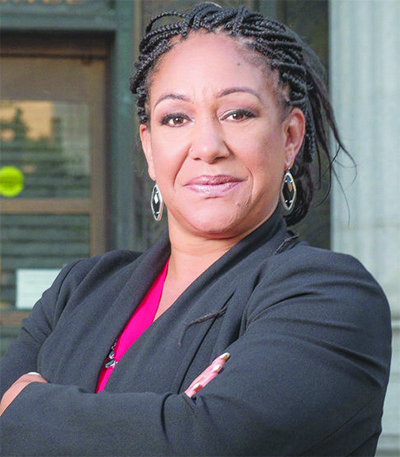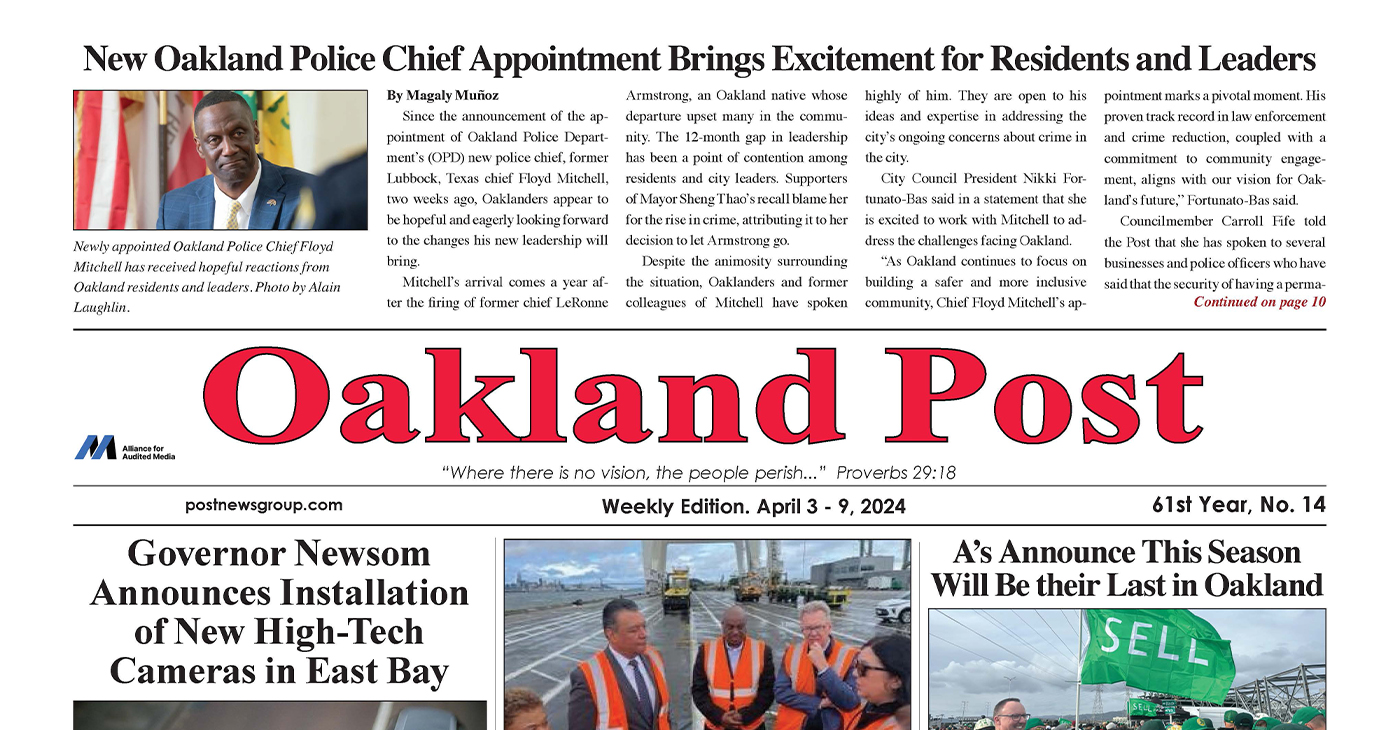News
Working Families Party, Democracy for America Endorse Cat Brooks for Mayor

The national Working Families Party (WFP) announced today that they are offering their sole endorsement to Cat Brooks for mayor of Oakland.
“At Working Families Party we want to create an economy that works for everyone,” said Delvone Michael, Senior Political Strategist for the National Working Families Party. “One where politicians are accountable to the working people, and NOT Out-of-Town Developers, Wall Street or wealthy CEOs. That’s why we are proud to endorse Cat Brooks, who will be a mayor for ALL of Oakland. While there are other candidates in the race who we have supported in the past, Cat Brooks is the best person to lead Oakland right now.”
The Working Families Party is a national political organization that runs aggressive campaigns to raise standards for working families and elect the next generation of progressive leaders. The WFP is considered by political commentators to be largely responsible for the 2013 election of New York City mayor Bill De Blasio.
Democracy for America (DFA) also announced their support for Brooks’s campaign. DFA is a member-driven, people-powered political action committee that connects national resources from progressive communities to local elections.
“We are absolutely thrilled to be supporting Cat Brooks’ campaign for mayor of Oakland,” said Jim Dean, Chair of Democracy for America. “Cat Brooks is doing what few elected officials are by challenging entire cities to be better. Running a campaign focused on supporting collaboration and community-based leadership, Cat is working for an Oakland that includes the voices of voters in the decisions that affect their lives — especially those involved in ensuring that law enforcement officers fulfill their mandate to protect and serve their community.
“Cat Brooks will move Oakland forward because she lived through breakdowns in government and public safety accountability. She has worked to solve problems from the ground up, not at the whim of distant corporate powers. Cat Brooks will change Oakland and that will light a path for the rest of the country and our failed political institutions.
“DFA is proud to support Cat Brooks campaign for Mayor of Oakland, and, after she’s elected, we look forward to doing what we can to help her deliver for voters and share with the country how she got it done.”
People all around the country look to Oakland to set an example of what is possible when elected officials have the support of a truly progressive electorate.
“Oakland can be an incubator for humane, sensible public policy that actually benefits working families and communities of color – policies that can be replicated across the country,” said Cat Brooks. “That’s why national progressive organizations like the Working Families Party and Democracy for America are joining our campaign. With the support of our national partners, we will work to create a model of how to govern in partnership with the people right here in Oakland.”
Commentary
Commentary: Republican Votes Are Threatening American Democracy
In many ways, it was great that the Iowa Caucuses were on the same day as Martin Luther King Jr. Day. We needed to know the blunt truth. The takeaway message after the Iowa Caucuses where Donald Trump finished more than 30 points in front of Florida Gov. De Santis and former South Carolina Governor Nikki Haley boils down to this: Our democracy is threatened, for real.

By Emil Guillermo
In many ways, it was great that the Iowa Caucuses were on the same day as Martin Luther King Jr. Day.
We needed to know the blunt truth.
The takeaway message after the Iowa Caucuses where Donald Trump finished more than 30 points in front of Florida Gov. De Santis and former South Carolina Governor Nikki Haley boils down to this: Our democracy is threatened, for real.
And to save it will require all hands on deck.
It was strange for Iowans to caucus on MLK day. It had a self-cancelling effect. The day that honored America’s civil rights and anti-discrimination hero was negated by evening.
That’s when one of the least diverse states in the nation let the world know that white Americans absolutely love Donald Trump. No ifs, ands or buts.
No man is above the law? To the majority of his supporters, it seems Trump is.
It’s an anti-democracy loyalty that has spread like a political virus.
No matter what he does, Trump’s their guy. Trump received 51% of caucus-goers votes to beat Florida Gov. Ron DeSantis, who garnered 21.2%, and former South Carolina Gov. Nikki Haley, who got 19.1%.
The Asian flash in the pan Vivek Ramaswamy finished way behind and dropped out. Perhaps to get in the VP line. Don’t count on it.
According to CNN’s entrance polls, when caucus-goers were asked if they were a part of the “MAGA movement,” nearly half — 46% — said yes. More revealing: “Do you think Biden legitimately won in 2020?”
Only 29% said “yes.”
That means an overwhelming 66% said “no,” thus showing the deep roots in Iowa of the “Big Lie,” the belief in a falsehood that Trump was a victim of election theft.
Even more revealing and posing a direct threat to our democracy was the question of whether Trump was fit for the presidency, even if convicted of a crime.
Sixty-five percent said “yes.”
Who says that about anyone of color indicted on 91 criminal felony counts?
Would a BIPOC executive found liable for business fraud in civil court be given a pass?
How about a BIPOC person found liable for sexual assault?
Iowans have debased the phrase, “no man is above the law.” It’s a mindset that would vote in an American dictatorship.
Compare Iowa with voters in Asia last weekend. Taiwan rejected threats from authoritarian Beijing and elected pro-democracy Taiwanese vice president Lai Ching-te as its new president.
Meanwhile, in our country, which supposedly knows a thing or two about democracy, the Iowa caucuses show how Americans feel about authoritarianism.
Some Americans actually like it even more than the Constitution allows.
About the Author
Emil Guillermo is a journalist and commentator. He does a mini-talk show on YouTube.com/@emilamok1.
Activism
Oakland Post: Week of April 10 – 16, 2024
The printed Weekly Edition of the Oakland Post: Week of April 10 – 16, 2024

To enlarge your view of this issue, use the slider, magnifying glass icon or full page icon in the lower right corner of the browser window. ![]()
Activism
Oakland Post: Week of April 3 – 6, 2024
The printed Weekly Edition of the Oakland Post: Week of April 3 – 6, 2024

To enlarge your view of this issue, use the slider, magnifying glass icon or full page icon in the lower right corner of the browser window. ![]()
-

 Activism4 weeks ago
Activism4 weeks agoOakland Post: Week of March 20 – 26, 2024
-

 #NNPA BlackPress3 weeks ago
#NNPA BlackPress3 weeks agoMayor, City Council President React to May 31 Closing of Birmingham-Southern College
-

 #NNPA BlackPress3 weeks ago
#NNPA BlackPress3 weeks agoCOMMENTARY: D.C. Crime Bill Fails to Address Root Causes of Violence and Incarceration
-

 #NNPA BlackPress3 weeks ago
#NNPA BlackPress3 weeks agoFrom Raids to Revelations: The Dark Turn in Sean ‘Diddy’ Combs’ Saga
-

 #NNPA BlackPress3 weeks ago
#NNPA BlackPress3 weeks agoCOMMENTARY: Lady Day and The Lights!
-

 #NNPA BlackPress3 weeks ago
#NNPA BlackPress3 weeks agoBaltimore Key Bridge Catastrophe: A City’s Heartbreak and a Nation’s Alarm
-

 #NNPA BlackPress3 weeks ago
#NNPA BlackPress3 weeks agoBaltimore’s Key Bridge Struck by Ship, Collapses into Water
-

 Activism3 weeks ago
Activism3 weeks agoOakland Post: Week of March 27 – April 2, 2024







































1 Comment